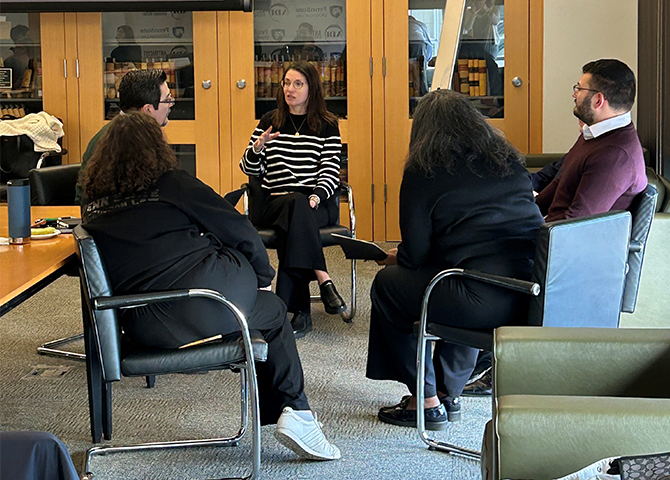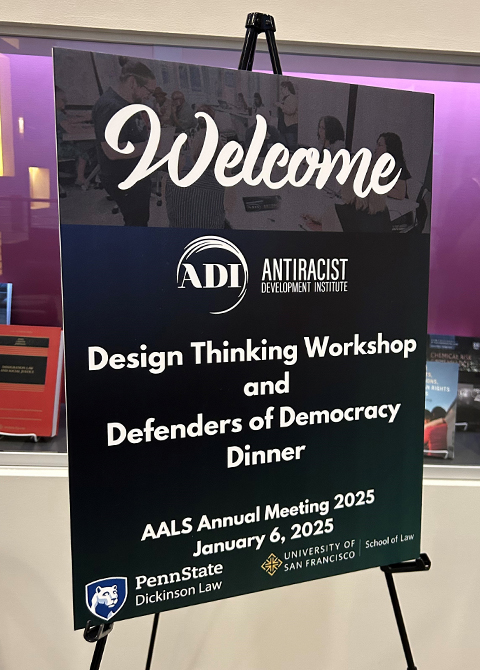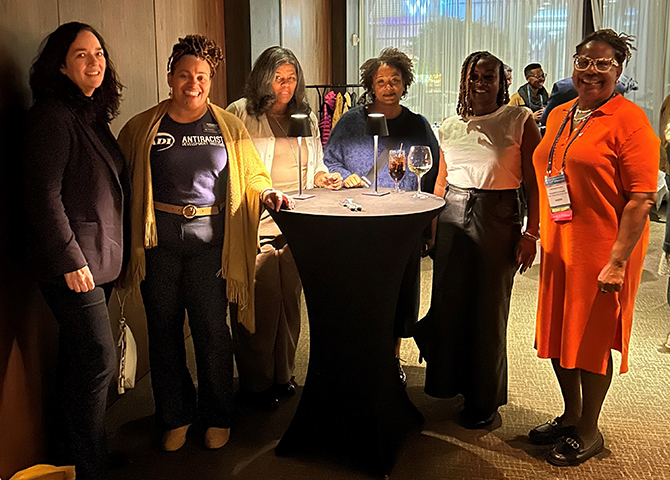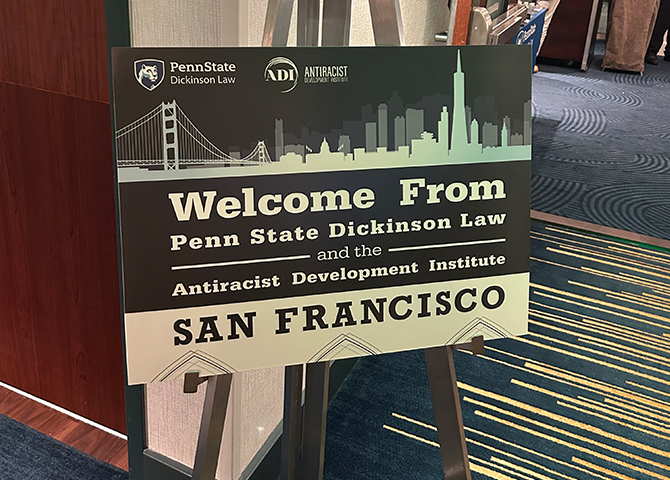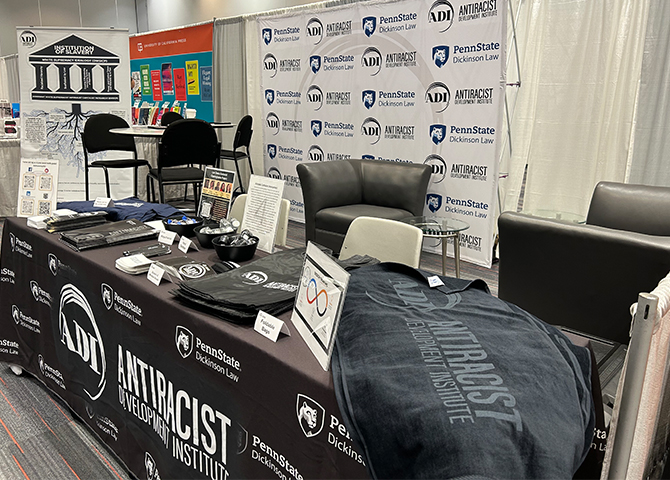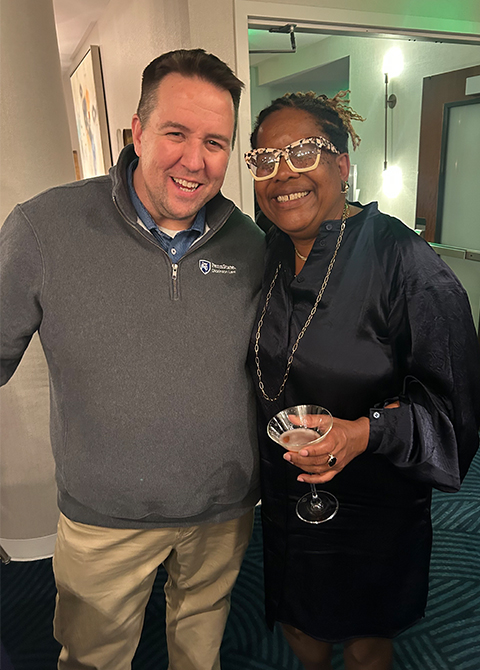ANTIRACIST DEVELOPMENT INSTITUTE OPENS A BUSY 2025 BY STRENGTHENING PARTNERSHIPS
March 2025 — The Antiracist Development Institute (ADI) at Penn State Dickinson Law kicked off the new year the same way it ended the last — by providing leaders and decision-makers with the vital tools and information necessary to help dismantle structures scaffolding systemic racial inequality, oppression, and intersectional injustice in the United States.
ADI leaders and systems designers journeyed to San Francisco in January to connect and collaborate with members of the legal academy. The ADI sponsored a Systems Design Workshop and Defenders of Democracy Dinner at the University of San Francisco (USF) School of Law on January 6, then attended the Association of American Law Schools (AALS) Annual Meeting from January 7-11. Each session, individual interaction, or reunion with participants from past events provided an opportunity to reaffirm the ADI’s ongoing commitment to engaging institutional antiracism.
“We eschew hierarchy. We invite and include all of you to join any part of this work,” said Dean and Donald J. Farage Professor of Law Danielle M. Conway during the workshop. “We want to make the teaching and learning with our partnering law schools in sessions like this one so seamless that when one of us is ready to take a break, the next one stands up to lead.”
Throughout the week, ADI leadership referenced the three-pillar approach to dismantle structures scaffolding systemic racial inequality, oppression, and intersectional injustice through systems design and design thinking, institutional antiracism, and critical pedagogy. These processes of inquiry and examination disrupt the traditional hierarchies Conway referred to and prioritize empathy to redesign systems that work for everyone. Once embedded inequities are revealed, a systems design rubric is deployed to transform one or more functions of the organization.
“People are experiencing pain in different ways due to the systems that the legal profession has supported in this country,” said ADI Program Manager TaWanda Hunter Stallworth. “The ADI shows people how to innovate, empathize, and humanize with others to solve problems or resolve these issues. This approach creates lasting, meaningful impact.”
Reshaping the approach to problem-solving
USF School of Law Dean Johanna Kalb invited the ADI to present. A contributor to the ADI’s upcoming “Building an Antiracist Law School, Legal Academy, and Legal Profession” book series in partnership with the University of California Press, Kalb found great value in the systems design training taken by chapter contributors.
More than a dozen staff and faculty members attended the workshop, which began with a short introduction to systems design taught by ADI Systems Designer Nicole Dyszlewski, assistant dean for curricular innovation at Roger Williams University School of Law in Rhode Island. The workshop included collaborative exercises on how to deploy design thinking and concluded with a short Q&A with Conway, Stallworth, Dyszlewski, and ADI Education Coordinator Serena Hermitt.
Kalb noted that design thinking provides an operational blueprint for USF School of Law as an antiracist law school. “The systems design approach has reshaped how I think about problem solving,” said Kalb. “Design thinking gives us a shared language we can use as we go about the work of being an antiracist law school, thinking more creatively about what we can do to make change in the world.”
Stallworth highlighted the importance of embracing the love ethos central to the ADI’s work. “Design thinking is empathy-driven, and grace and love abound in this space,” said Stallworth. “We can love each other and work toward creating something new and better that works for you and all of your students.”
Staff and faculty came away from the event eager to institute new means of critical thinking. Kalb encouraged them to take the initiative on implementing those approaches. “I look forward to staying engaged and connected with the ADI,” said Kalb. “One of the fabulous things about this book series is that it is a book series, but it is also a movement. It serves as an organizing principle for bringing together people who care about antiracism.”
Forming and renewing connections at AALS
The ADI spent the remainder of its time in San Francisco focusing on the AALS Annual Meeting, where it had a booth. Dozens of attendees interested in supporting the ADI coalition dropped by to ask questions, sign up to receive more information, and gather fun swag like branded keychains and lip balm.
The ADI sponsored an evening of “Coalition, Conversation, and Cocktails” at Fogo de Chão, a Brazilian steakhouse. Law school faculty, staff, and esteemed guests, including American Civil Liberties Union (ACLU) President Deborah Archer, gathered for discussions and fantastic food and drink — including the restaurant’s signature bacon appetizer.
Additionally, the ADI co-hosted a Collaborative Reception with Roger Williams University School of Law, where Deans Conway and Gregory W. Bowman mingled with a large crowd at the Intercontinental San Francisco.
The ADI wrapped up its trip by co-hosting the Penn State Dickinson Law Alumni Reception with the Law School, again at the Intercontinental. Guests ate, drank, and reconnected while cheering on the Penn State football team, which, alas, lost in the national championship semifinals.
The ADI is planning a slate of workshops and events in 2025, including the upcoming mini-convening on May 15-16. Anyone interested in joining the ADI coalition can also fill out this survey to identify ways they can assist.
